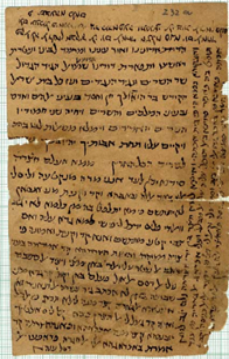Source 2: A Petition by the Wife of Abū al-Faraj
In a petition to the head of the Egyptian Jewish community, the wife of the silkweaver Abū al-Faraj asks for help after her husband abandoned her and their daughter to take up with the wife’s slave woman at his sister’s house. Abū al-Faraj also apparently refuses to pay his wife the full delayed marriage gift due her in the event of a divorce. Mid-twelfth century. Judeo-Arabic.

Translated from the Judeo-Arabic by Craig Perry and Oded Zinger. Budapest: DK 232.1. Published in Steiner Vilmos, Három arab kézirat az ó-kairói genizából (Budapest: Márkus Samu, 1909). This translation CC BY-NC-ND 4.0.
A Petition by the Wife of Abū al-Faraj
I inform His Excellency, our lord, may you rule forever, that I am a desolate woman. I do not have (anything) except recourse to God and to you. I have fallen in with a man who is not ashamed by his untoward words. My father does not provide for me from his income and my brother is (too) young and bashful (to help). I have fallen, truthfully, into great distress.
Your Excellency ordered (my husband) … to go and renew our wedding contract to its original form. My husband said, “I have made an oath that I will not (promise) anything except 10 dinars and that I will give (my wife) the slave woman.” He intended that the slave-girl would not leave (our) house…. He also gave me ownership over the slave woman, but declared that he would not give me her daughter; he kept the daughter.
Your Excellency ordered that (my husband) send (the slave woman) out to the adjacent, separate quarters. (But he) resisted and delayed sending her out, and he kept her as she is, in the house of his sister. Further, when he was before your Excellency, he did not accept your mediation. You, our Lord, ordered him to pay a sum of money and to remove the slave woman from his sister’s possession…
He has left me and the young girl (our daughter). We are cast to the floor. He pays us absolutely no attention. He keeps the slave woman at his sister’s and he maintains her as needed. My matter is not sufficient for His Excellency, the elder Abū Isḥāq. (My husband) has found someone who supports him in what he says. I have no defender except almighty God and you. May the Holy One, blessed be He, not lock your door in the face of any desolate, ill- treated person or a person who is tied to you. Peace.”
[A second subsequent petition reveals that Abū al-Faraj eventually purchased his wife’s slave woman from her—though he refused to pay the entire price. He continued to reside with the slave woman at his sister’s house much to the consternation of local Jewish officials and his ex-wife.]
Discussion Questions
- What steps, or actions, has the wife of Abū al-Faraj taken to defend her rights and interests? What are the obstacles she faces?
- Why do you think Abū al-Faraj is able to get away with this behavior?
Related Primary Sources
- ‘No One Sees and Every Man Does as He Sees Fit’: Slavery and Masculinity in the Jewish Community of Medieval Egypt
- Source 1 – A Legal Query to Abraham Maimonides and His Response
- Source 3 – Comments on Medieval Masculinity by Ruth Karras and Oded Zinger
- Source 4 – A Court Deposition from ʿAydhāb
- Source 5 – A Legal Query to Moses Maimonides
